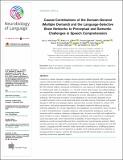Causal contributions of the domain-general (Multiple Demand) and the language-selective brain networks to perceptual and semantic challenges in speech comprehension
Author(s)
MacGregor, Lucy J; Gilbert, Rebecca A; Balewski, Zuzanna; Mitchell, Daniel J; Erzinçlioğlu, Sharon W; Rodd, Jennifer M; Duncan, John; Fedorenko, Evelina; Davis, Matthew H; ... Show more Show less
DownloadPublished version (2.200Mb)
Publisher with Creative Commons License
Publisher with Creative Commons License
Creative Commons Attribution
Terms of use
Metadata
Show full item recordAbstract
<jats:title>Abstract</jats:title>
<jats:p>Listening to spoken language engages domain-general multiple demand (MD; frontoparietal) regions of the human brain, in addition to domain-selective (frontotemporal) language regions, particularly when comprehension is challenging. However, there is limited evidence that the MD network makes a functional contribution to core aspects of understanding language. In a behavioural study of volunteers (n = 19) with chronic brain lesions, but without aphasia, we assessed the causal role of these networks in perceiving, comprehending, and adapting to spoken sentences made more challenging by acoustic-degradation or lexico-semantic ambiguity. We measured perception of and adaptation to acoustically degraded (noise-vocoded) sentences with a word report task before and after training. Participants with greater damage to MD but not language regions required more vocoder channels to achieve 50% word report, indicating impaired perception. Perception improved following training, reflecting adaptation to acoustic degradation, but adaptation was unrelated to lesion location or extent. Comprehension of spoken sentences with semantically ambiguous words was measured with a sentence coherence judgement task. Accuracy was high and unaffected by lesion location or extent. Adaptation to semantic ambiguity was measured in a subsequent word association task, which showed that availability of lower-frequency meanings of ambiguous words increased following their comprehension (word-meaning priming). Word-meaning priming was reduced for participants with greater damage to language but not MD regions. Language and MD networks make dissociable contributions to challenging speech comprehension: Using recent experience to update word meaning preferences depends on language-selective regions, whereas the domain-general MD network plays a causal role in reporting words from degraded speech.</jats:p>
Date issued
2022Department
Massachusetts Institute of Technology. Department of Brain and Cognitive SciencesJournal
Neurobiology of Language
Publisher
MIT Press
Citation
MacGregor, Lucy J, Gilbert, Rebecca A, Balewski, Zuzanna, Mitchell, Daniel J, Erzinçlioğlu, Sharon W et al. 2022. "Causal contributions of the domain-general (Multiple Demand) and the language-selective brain networks to perceptual and semantic challenges in speech comprehension." Neurobiology of Language, 3 (4).
Version: Final published version